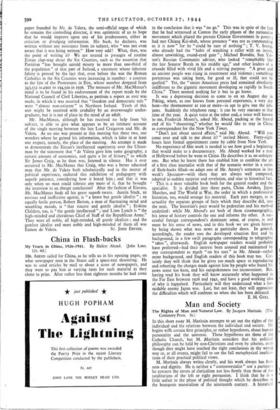China in Flash-backs
MR. ABEND sailed for China, as he tells us in his opening pages, on what newspaper men in the States call a space-rate shoestring. He was to send articles by mail to about a score of newspapers, and they were to pay him at varying rates for such material as they chose to print. After rather less than eighteen months he had come to the conclusion that it was "no go." This was in spite of the fact that he had witnessed at Canton the early phases of the nationalist movement which placed the present Chinese Government In power' had met Chiang Kai-shek, whose presence "was not as commanding as it is now" for he "could be sure of nothing " ; T. V. Soong, who already had the "habit of watching a caller with an intent, almost unwinking, round-eyed-gaze"; Michael Borodin, Sun Yat- sen's Russian Communist adviser, who looked "remarkably like ' the late Senator Borah in his middle age," and other leaders of a crusade filled with vivid life and a stirring purpose. "A great and an ancient people was rising in resentment and violence ; something portentous was taking form for good or ill, that could not be quelled." Yet, the "entire American press had remained absolutely indifferent to the gigantic movement developing so rapidly in South China." There seemed nothing for it but to go home.
It was a depressing decision to come to on an August day in Peking, when, as One knows from personal experience, a very dry heat—the thermometer at ioo or more—is apt to give one the lint- jams. Suddenly the telephone rang: it can be very staccato at that time of the year. A quiet voice at the other end,.a voice well known to me, Frederick Moore's, asked Mr. Abend, packing at the frayed end of his "shoestring," whether he would like to stay in China as correspondent for the New York Times.
"Don't jest about sacred affairs," said Mr. Abend. "Will you come over and talk to me about it?" invited Mdore. Forty-eight hours later formal appointment came by cable from New York.
No experience of film work is needed to see how good a beginning that would make to a documentary. Mr. Abend worked for a year at Hollywood before he went to China. He describes it as an unhappy one. But what he learnt there has enabled him to combine the art of a first class journalist with that of the scenario writer in a series of flash-backs filled—to adapt one of Mr. Anstey's sentences in last week's Spectator—with shots that are always well composed, adapted to sudden surprise and revelation, and true to historical fact.
• This is a most valuable book both for the general reader, and the specialist. It is divided into three parts, China Awakes, Japan Marches, and The World at War, the order in which a professional historian, too, would arrange his material. Each part merges, as in actuality the separate groups of facts which they describe did, into the next. The historian's pace would be pedestrian and his method analytical: while Mr. Abend's are both of them cinematographic, his sense of history controls the one and informs the other. A suc- cessful foreign correspondent's dominant sense, of course, is and must be his sense of news, and in this book we are given history by being shown what was news at particular dates. In general, accordingly, the reader sees the developed situation first and its background, in a few swift paragraphs corresponding to telegraphic "takes ", afterwards. English newspaper readers would probably have preferred—had their interest been aroused and maintained by any correspondent as much "on his toes-" as Mr. Abend—rather more background, and English readers of this book may too. Cer- tainly they will think that he gives too much space to reproducing and rebutting the charges made against him by people who found his news sense too keen, and his outspokenness too inconvenient. But, having read his book they will know accurately what happened in the Far East between 1926 and 1941, and have a good working idea of why it happened. Particularly will they understand what a for- midable enemy Japan was. Last, but not least, they will appreciate the difficulties which will confront us when she has been defeated.
E. M. Glni.


























 Previous page
Previous page